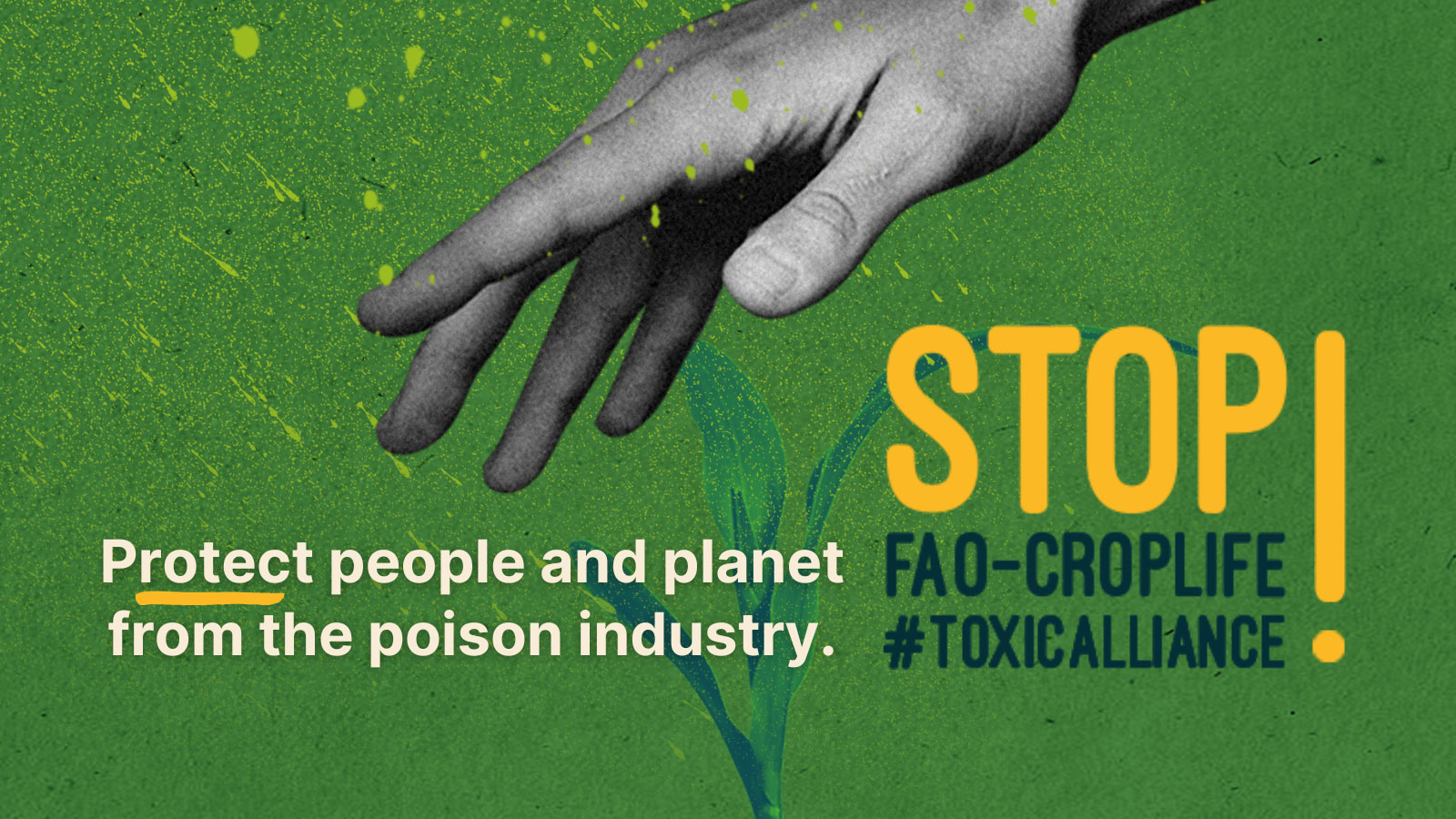Reminding the UN Food and Agriculture Organization (FAO) of its obligations to uphold human rights, 430 civil society and Indigenous peoples organizations from 69 countries across the globe today called on the FAO Council to rescind the agency’s partnership with CropLife International, the industry association representing the world’s largest pesticide manufacturers.
Ahead of the FAO Council’s 170th session that begins on June 13, Pesticide Action Network (PAN) submitted to members of the Council a letter co-sponsored by 10 other global networks, and on behalf of the 430 organizations, urging it to take immediate action in the Council session. This demand builds on the ongoing concerns expressed by civil society and Indigenous People’s organizations, and on recommendations made by the UN Special Rapporteur on the Right to Food during the Human Rights Council’s 49th session, namely: “to review the agreement with CropLife International with an eye to human rights concerns” and “to consider directing the Director-General of FAO to rescind the agreement.”
In the letter, the 430 organizations expressed concerns about how CropLife member companies (BASF, Bayer Crop Science, Corteva Agriscience, Sumitomo, FMC and Syngenta) have “interfered in national policy and exert enormous pressure on governments that take measures to protect people and the environment from pesticide harms.”
In October 2020, the FAO signed a Letter of Intent with CropLife to cooperate on a broad range of areas, as part of the agency’s Private Sector Engagement Strategy. “FAO deepening its collaboration with CropLife International directly counters any efforts toward progressively banning Highly Hazardous Pesticides, as recommended for consideration by the FAO Council as early as 2006,” the letter stated.
“This partnership has been in effect for over a year and a half now, and FAO’s efforts to push global action to phase-out and ban HHPs have ground to a halt,” said Keith Tyrell, Chair of PAN International. “As the signers underscore in this letter, Member States and the FAO must promote agroecology, a viable approach for generating ecologically-based food and farming systems without the use of toxic pesticides.”
The letter pointed out that FAO’s own due diligence process indicates that companies involved in human rights abuses can be excluded from potential partners. The organizations assert that the “use of hazardous pesticides is inconsistent with the rights protected by the United Nations to: Health; Clean, healthy and sustainable environment; Safe working conditions; Adequate food; safe and clean water and sanitation; A dignified life; and Rights of Indigenous Peoples, women, children, workers, and peasants and other people working in rural areas.”
In addition, a briefing report entitled “Addressing the Conflict of Interest and Incompatibility of FAO’s Partnership with CropLife International”–detailing the necessity to end what civil society and Indigenous peoples call the “Toxic Alliance” between the FAO and the pesticide industry–was submitted to the FAO Council by PAN and 10 other global organizations spearheading the campaign.
A separate briefing report entitled “Corporate Capture of FAO: Industry’s Deepening Influence on Global Food Governance,” which featured contributions by PAN International, was also submitted to the FAO and Member States in time for the FAO Council session. The report highlighted the partnership with CropLife as among the case studies exemplifying the trend where corporations are being given increasing influence at the expense of states, small scale food producers, Indigenous Peoples and civil society. ###
Reference:
Keith Tyrell, PAN International Chair, keith@pan-uk.org
Letter to the FAO Council
English: https://bit.ly/LetterFAO2022
Spanish: https://bit.ly/CartaFAO2022
French: https://bit.ly/LettreFAO2022
Briefing Report to FAO Member States: https://bit.ly/ToxicAllianceBrief








Discussion about this post